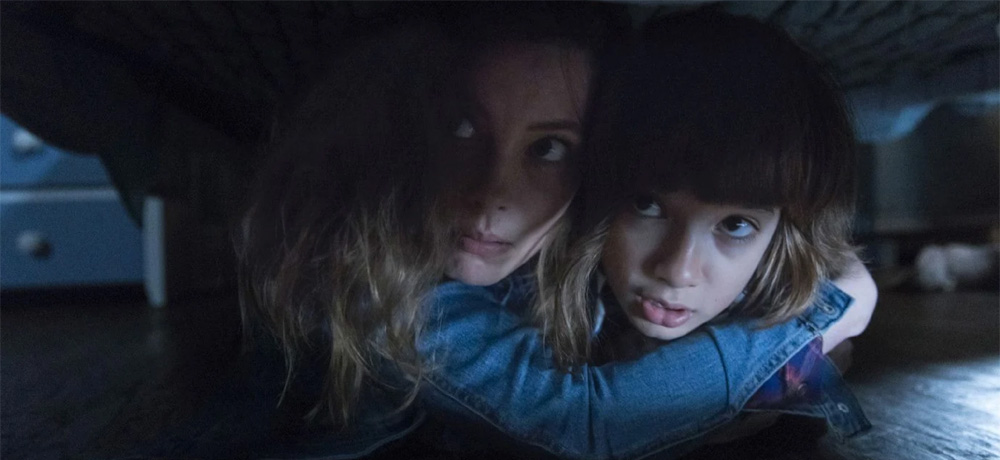






A light flickers, flashes, and then blows out. A young boy, panicked, looks intently around his bedroom, holding the glow of a cell phone screen out to illuminate the darkness in the corners. A low grumbling voice grows into a shrieking scream, footsteps pound with booming tremors, the young boy sits covered with a sheet draped over his head.
This scenario could come from any realm of a horror film but it plays the introduction to writer/director Jacob Chase’s debut feature film Come Play. The scene of a terrified child placed in a frightful situation, sometimes known as the “child in peril” device, has populated film in many different forms. Sometimes it’s fun, like in The Goonies, playful, like in The Monster Squad, and other times downright scary and disturbing, like in The Babadook or It. Come Play falls into the scary category, a film that depends less on its jump scare tactics and more on the unease it conjures by placing a defenseless child within arm’s reach of a monster from another realm.
Oliver (Azhy Robertson) is a lonely boy who feels different from everyone around him, most of the kids at his school mock his silence and some take advantage of his kindness with cruel jokes. Looking for a friend, Oliver seeks refuge within the screen of his tablet or cell phone, watching episodes of SpongeBob SquarePants and playing with screen applications to take pictures of himself. One day Oliver discovers a story that mysteriously appears on his device, a creepy tale about a lonely monster named Larry who is looking for a friend. As Oliver engages with the story, Larry becomes more threatening, inching closer to a real-life connection with Oliver.
Director Jacob Chase adapts Come Play from his 2017 short film “Larry”. While there are moments throughout the feature that feel stretched unnecessarily, a common concern when a short film idea is built into a feature length film, Come Play still displays some interesting family character dynamics and a lead performance from Azhy Robertson that is exceptionally composed.
It’s these moments, with a family struggling on the brink of separation and their son desperately retreating further into his protective shell, that adds the emotional component to make the scary and threatening monster have a gravity of consequences. Specifically, the story between the mother and son is so tenderly composed that when Larry begins to stalk the entire family, the peril for the characters is peaked with tension. It’s ultimately what makes Come Play so effective.
Larry, the ominous 10-foot tall entity lingering in the dark corners, is mostly a practical effect monster…yes, you read that correctly. In the current days where monsters are computer-generated designs, hearing that the Jim Henson Creature Shop designed this monster, where 4 puppeteers operated the movement, is a complete blessing for movie monsters. While CGI is still used for certain movements and expressions, these moments are hardly scary, Mr. Chase uses the monster in effective frightening ways late in the film, showing the creepy nature of Larry as it stalks Oliver and his mother.
Come Play struggles with maintaining its pressing and menacing tone throughout the film but it makes up for these lapses with an effective cast that is provided time to add the emotional components to make the final act scarier than it probably would have been. Jacob Chase proves an understanding of how to set up a scare but, most impressively, the ability to craft characters that mean something to the story. While film will never stop relying on putting children in perilous situations, or placing scary monsters in closets, Come Play proves that there is still life and scares to be mined from these movies.
Movie Score: 3.5/5